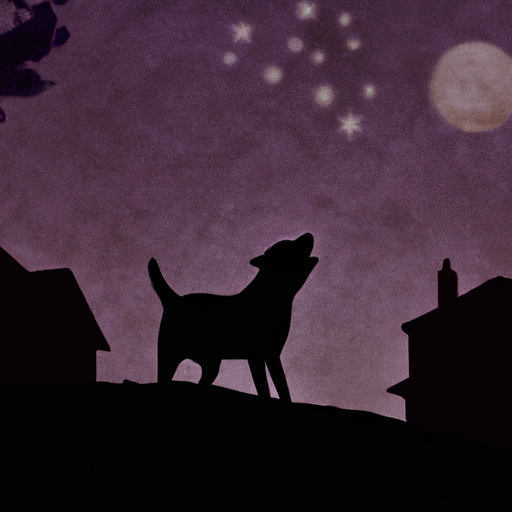Understanding Your Dog’s Behavior
You might have wondered why your sweet, furry companion suddenly turns into a howling beast under the moonlight. Is it some sort of canine ritual? Or is there more to it that we need to understand? As a caregiver, you naturally feel the need to understand what’s going on and how you can help. Here are some reasons that explain why dogs howl at night:
- Communication: Dogs, like wolves, use howling as a form of communication. It might be a way for them to alert other dogs of their presence or to express their loneliness.
- Response to sounds: Dogs have a keen sense of hearing. High pitched sounds like sirens, music or even a baby crying can trigger them to howl.
- Separation anxiety: If your dog is used to your presence during the day, they might howl at night due to anxiety from being alone.
Deciphering the Howl
Not all howls are created equal. Just as we have different tones and inflections in our voices, dogs too express themselves in different ways. Here’s a table to help you understand what different howls might mean:
| Type of Howl | Possible Meaning |
|---|---|
| Long, sustained howl | “I am here! Where is everyone?” |
| Short, sharp howl | “Something has caught my attention!” |
| Constant howling | “I’m anxious and need comfort.” |
When to Seek Help
While occasional howling is normal, excessive howling could be a sign of distress or an underlying health issue. If you notice any of these signs, it might be time to seek help from a professional:
- Your dog’s howling is accompanied by other signs of distress like pacing, destructive behavior, or uncontrolled urination.
- The howling is getting more frequent or intense.
- You notice a sudden change in their howling pattern.
How to Handle Your Dog’s Howling
Understanding why your dog howls is one thing, knowing how to respond is another. Here are some tips on how to handle your dog’s howling:
- Don’t reinforce the howling: If your dog howls for attention and you respond every time, you’re reinforcing that behavior.
- Distract them: If your dog is howling in response to a particular sound or event, try to distract them with a toy or a treat.
- Provide comfort: If your dog is howling due to anxiety, they might need some extra comfort and reassurance from you.
Frequently Asked Questions
Q: Why does my dog howl more during full moons?
A: This is likely due to increased activity and noise outside, not any mystical connection to the moon.
Q: Can all breeds of dogs howl?
A: While all dogs are capable of howling, some breeds are more prone to it than others.
Q: Is howling a sign of pain in dogs?
A: While it can be, howling is not always a sign of pain. However, if your dog’s howling is accompanied by other signs of discomfort, it’s best to consult a vet.
Q: How can I stop my dog from howling at night?
A: Try to identify the cause of the howling first. If it’s due to loneliness or anxiety, providing comfort can help. If the howling is due to external triggers, try using white noise or soothing music to mask the sounds.
Remember, every dog is unique. What works for one might not work for another. But with patience and understanding, you’ll be able to help your furry friend navigate through the nights more peacefully.



